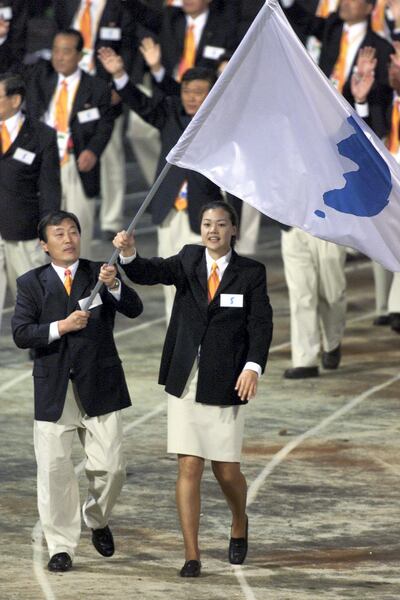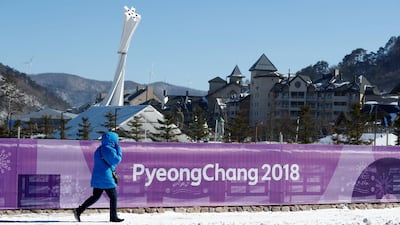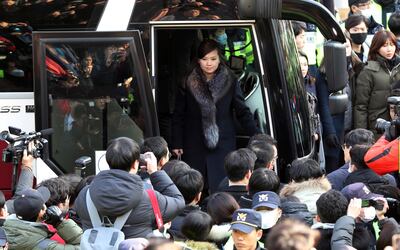In fur stole and stiletto boots – not an everyday North Korean look – Hyon Song-wol was quite the diva as she led her team into enemy territory. She smiled, but did not speak to the Seoul press scrum eager to glimpse Pyongyang’s most famous – or notorious – cultural export.
Still widely tagged as Kim Jong-un's ex (in fact more likely his late father's), in 2013 reports claimed Hyon was executed for a supposedly explicit video. But she is very much alive, and a power in the land.
Besides leading the all-female Moranbong Band, Mr Kim’s bid to advance North Korean music from 1950s Stalinist mulch to 1970s disco kitsch, Hyon was promoted – along with Mr Kim’s sister Kim Yo-jong – to the Central Committee of the ruling Workers’ Party in October.
She came, she saw and she returned, still with no words for the media.
Hyon was inspecting venues for the North's 140-strong Samjiyon Orchestra to perform during the Winter Olympics, which begin on February 9 in Pyeongchang, South Korea. As this suggests, for Mr Kim sport is hardly the point.
Besides 22 athletes (skaters, skiers and women’s ice hockey), whose belated participation the International Olympic Committee approved on January 20, Mr Kim is sending musicians, martial artists, cheerleaders and a high-level delegation: some 550 in all.
This is very sudden. Until his New Year address, when he pretty much invited his country to Pyeongchang, the young North Korean leader had evinced zero interest in either the Games (deadlines had long passed) or, oddly, his new Southern counterpart. Unlike the hardline Park Geun-hye, now in jail facing charges after her impeachment last year, her successor Moon Jae-in is a liberal whose avowed hope was to restore the “sunshine’ era (1998-2007), when the two Koreas began to engage after decades of hostility and achieved a small degree of rapprochement. Yet Mr Kim had ignored or snubbed Mr Moon’s many overtures – until now.
Why the volte-face? To be clear, this is no outbreak of wider peace. In the same speech, Mr Kim warned Washington that “the nuclear button is always on my desk”; Donald Trump riposted that his button was bigger (boys, boys). Pyongyang has always insisted that the nuclear and missile issues are not on the inter-Korean agenda. On January 9 it scolded Seoul for raising them.
Still, a pause – at least until the ensuing Paralympics finish on March 18 – is welcome after months of dangerously escalating tensions on the peninsula. South Korea is hugely relieved that this cloud over the Pyeongchang games, which also faced other problems, has lifted.
That the Koreas are talking again is good too. In the sunshine era regular meetings let both sides get to know each other, institutionally and personally, including at two summits. But the key players then are now dead. Very few in Seoul have met Mr Kim, now six years into a reign that could last decades (he turned 34 on January 9), or his entourage.
For each regime simply to get the other’s measure must lower the risk of misunderstanding or miscalculation.
Beyond this, however, it is hard to get excited. Nothing the two Koreas have now agreed to is really new.
Marching together in the opening ceremony under a unification flag? They did that nine times already between 2000 and 2007, including at three Olympics (Sydney, Turin, Athens).
Joint teams? In 1991 there were two: in youth soccer and at the world table tennis championships in Chiba, Japan where a mixed North-South women’s squad sensationally won, beating China. But never again, in any sport, for a quarter of a century. So Pyeongchang’s unified women’s ice hockey team – a sport where neither Korea has medal hopes – is hardly a breakthrough.
The list goes on. Taekwondo? A Northern team came South only last June – but then reneged on hosting Southern counterparts. Art troupes? Six Pyongyang ensembles performed in Seoul between 1985 and 2002, although with 80 musicians and 60 dancers Samjiyon is the largest yet.
Cheerleaders? The North’s demure beauties turned heads the first time, at the Asian Games in Busan in 2002. A year later, at the Daegu World Student Games, their popularity plunged when they got off their bus and tearfully upbraided local well-wishers waving placards of 2000’s North-South summit. It was raining, and the sacred portrait of Kim Jong-il must not get wet.

Such incidents have dampened Southern enthusiasm too, more than Mr Moon may have realised. Even for sunshine’s supporters, initial hope that joint teams or even joint entrances (hardly a big deal on any level) might prove cumulative, let alone kick-start a wider peace process, have been utterly dashed. What is the point of sporadic one-off gestures when they lead nowhere?
Besides, they come at a cost – including literally. Seoul long ago set a bad example by paying for everything (including that 2000 summit: half a billion dollars in cash, under the table). So Pyongyang expects a free ride, and as usual is getting one. No reciprocity there, just cynicism.
Another cost is policy consistency. With far tighter United Nations and indeed bilateral sanctions in force since Mr Kim’s flurry of nuclear and ballistic missile tests in 2016-2017, Mr Moon must step gingerly to avoid breaching these, or seek exemptions.
This may affect ships or flights from the North – unless all 550 Northerners cross the Demilitarised Zone by land, which is still legal.
The top-level delegation is a problem too. It should include Choe Ryong-hae, the undisputed No 2 in Pyongyang since the apparent purge of his long-time rival Hwang Pyong-so (not seen since October).
Both men went South briefly in 2014 for the closing ceremony of the Incheon Asian Games, although to Seoul’s dismay they brought no message from Mr Kim. In late 2016, Ms Park’s government personally blacklisted Mr Choe, so Mr Moon would have to lift the ban. Such are the dilemmas of balancing stick and carrot in dealing with North Korea. A third cost is to sport. As their Canadian coach has set out with commendable frankness, the joint team is unfair to the South’s players. Inevitably some will get less time on the rink – and how can they bond as a team with total strangers in just a few days?
Switzerland, in the same group, is complaining that Korea has a pool of 35 players, while others are limited to 22.
_______________
Read more:
Reasons to be sceptical about Korean opportunity
Credit Trump with the thawing of Pyongyang’s relations with Seoul
Two Koreas in talks on Winter Olympics after the North agreed to attend the games
_______________
The fourth cost is political. The two governments may have agreed that each Korea will cheer on the other, but the South Korean public has other ideas. Several polls show a clear backlash, going beyond predictable right-wing grumbles that these are now the Pyongyang Games.
As they often do, far-right activists marked Hyon's arrival by burning Mr Kim's image and the Northern flag. Pyongyang is demanding an apology. It had already told Mr Moon to rein in conservative media, and accused him of "brown-nosing" for crediting the new inter-Korean thaw to Mr Trump (as the beggar explicitly asked him to, it seems).
Hawk wrath was inevitable. But Mr Moon cannot have expected how badly his Olympic peace initiative would go down with the public at large – especially the young, hitherto his strong supporters. About 80 per cent of Southern 20-30 year olds oppose a unified hockey team, with almost as many wanting South Korea to march under its own flag. Mr Moon’s overall approval rating, still a remarkable 73 per cent after eight months in office, fell to 67 per cent as of January 19.
Part of this backlash is because Mr Kim is dictating the agenda. Initially, the South said it would push for reunions of separated families. The last was in 2015, and the elderly cohort pining to see kin after decades apart is dying off daily.
But no more has been said, so presumably the North nixed this. True reconciliation would mean reciprocity, not spineless concessions.
Beneath policy dilemmas lie seismic shifts in sentiment. Bluntly: does Korea still even exist in 2018? After 73 years marching down sharply divergent roads, what – beyond a language and some residual cultural traits – do North and South share any more? On both sides of the DMZ, the polities that hold people’s allegiance are the two they live in. That is the reality.
I wish the Pyeongchang Olympics every success. Likewise the various inter-Korean events. But is all this a breakthrough? No. Will the thaw last? I doubt it. But how I long to be wrong.


